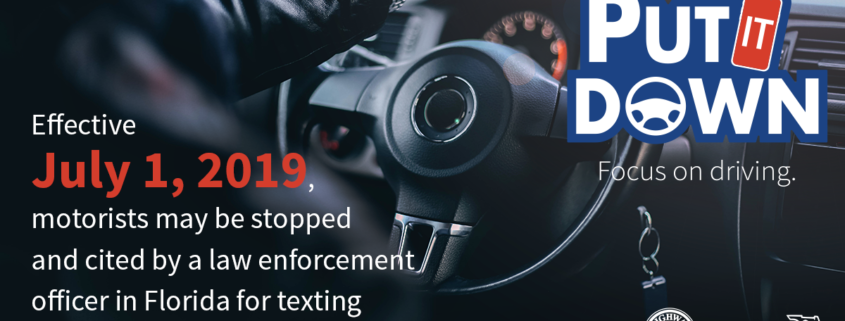Texting and driving can be a dangerous combination. In a 2014 report, the US Department of Transportation National Highway Traffic Safety Administration studied data from 2012. The data revealed that distracted driving was associated with 3300 deaths and 421,000 injuries in collisions in the US; much of the evidence in these cases suggests that smartphone use continues to be a substantial contributor to these incidences.
Further, AAA recently conducted a study that revealed 78% of Americans suggest that texting while driving is a “significant danger.” The study also cited that 35% of the respondents admitted to texting while driving.
Starting July 1, 2019, texting while driving has been defined as a primary offense in the state of Florida. Many people don’t realize that texting and driving was illegal before the July change. The difference is that previously, a law enforcement officer had to witness you violating another law to be able to pull you over for texting while driving.
In early 2019, the Florida government voted to change that.
With the July 1 change and texting while driving becoming a primary offense, authorities can pull you over if they see you typing on your phone or other hand-held devices.
Here are some of the top questions we have been asked about the new law.
Someone told me that if I am stopped for texting while driving, a police officer can ask to see my phone to verify that I was texting. Is this true?
This is actually true; officers are allowed to ask to see the phone of the driver who was pulled over for texting while driving, with one caveat. While the responding officer can ask to see your phone, they must tell you that you have the right to decline the request.
The original law making texting and driving a secondary offense started in 2013. Since then, officers have received training to be able to identify drivers who are texting. If you are stopped, it is because an officer believes you were texting while driving based on your behaviors.
How do things change after July 1?
Florida statute 316.305 — which is known as the Florida Ban on Texting While Driving Law, officially changes the law against using a mobile phone or hand-held device from a secondary offense to a primary offense. Beginning on July 1, law enforcement officers can pull over drivers for using a wireless device while operating a vehicle.
And there’s more. There’s also a part of the law about school zones and construction sites with active workers. This part of the law states that starting October 1, 2019, phones or hand-held devices can only be used in a “hands-free” manner while in use in a school zone, school crossing area, or construction area with active workers.
What happens if I get pulled over for texting while driving after July 1, 2019?
The answer to this question is “it depends.” Depending on the law enforcement agency that has stopped you, the outcome might vary.
The Florida Highway Patrol has released a statement suggesting that they will be issuing warnings until January 1, 2020. They are considering the time between now and then to be an “educational period.” Meanwhile, in Volusia and Orange Counties, the Sheriff’s Offices have stated that will begin ticketing offenders immediately.
Our suggestion is to simply obey the law, regardless of where you happen to be driving.
Can I still text while stopped at a red light?
The law does not specifically state that you cannot check your phone while parked on the side of the road or at a red light; it is not advised. Ultimately, when you are behind the wheel of a motor vehicle, your attention should be on your surroundings and making sure you and those around you are safe.
Can I be exempt from the texting while driving law?
There are a few instances where you might be exempt from this law. These include if you are reporting an emergency or criminal activity to law enforcement, if you are operating an autonomous vehicle in autonomous mode, or if you are receiving messages that are related to the operation or navigation of the vehicle. You could also be exempt if you are using the device for system or navigation purposes.
These are certainly not “get out of jail free” cards, so be smart with how you use technology and put safety first always.
Under the new law, can I legally press a button on my phone to answer a call?
Outside of a school or work zone, according to the law, you are allowed to activate, deactivate, or initiate a feature or function on your phone, as long as it doesn’t require multiple key presses.
In a school or work zone, the law suggests that you can use only hands-free features to activate, deactivate, or initiate a feature or function on the phone. So, using Siri on an iPhone or “Ok Google” on an Andriod phone is permitted.
Focus on Driving Campaign
While there are groups who worked to prevent this law, it’s essential to consider that the spirit of the law is to keep people safe. These include the driver, the car’s occupants, other drivers, and pedestrians.
The State has created a “Put It Down” campaign to bring awareness to the new law. You can follow hashtags #PutItDown and #FocusOnDrivingFL for more information.
Last Updated on July 2, 2019 by The Orlando Law Group








